LOOKING CLOSER
The Norwegian fishing vessel M/V Krossfjord tackled problematic lacquer formation, reduced oil consumption and lowered its operating costs by switching to Mobil Delvac 1640 cylinder oil.
Lacquer formation
Just 18 months after delivery from the shipyard where she was built, M/V Krossfjord, began experiencing radically increased oil consumption due to lacquer formations in the engine’s cylinder liners.
Working in conjunction with ExxonMobil Marine Product Solutions and with the input of MAN Diesel A/S, the owner initiated an 8,000-hour field trial to investigate the effectiveness of Mobil Delvac 1640 , as a way to solve the problem.
“I was interested in controlling the lacquering, improving the engine’s reliability and cutting the vessel’s operating costs,” said Knut W. Hamre, owner of M/V Krossfjord, “but we also recognised that solving the lacquer problem could yield environmental benefits — including reducing lube-related emissions, due to the reduction in oil consumption.”
Technical challenge
Lacquer formation has become increasingly common in modern medium-speed engines that burn low-sulphur distillate fuels. If left unchecked, lacquer can build up in cylinder liners, leading to scoring or polishing and necessitating more frequent liner replacements. Increased oil consumption is a typical symptom.
A solution to this technical challenge is an advanced engine lubricant, such as Mobil Delvac 1640, which can reduce cylinder oil lacquering formation.
Field test resultsThe engine of M/V Krossfjord had been operating for 3,000 hours when the field test began. Throughout the test, oil samples were sent at regular intervals to the ExxonMobil Mobil Serv℠ Lubricant Analysis laboratory. At the end of the 8,000-hour trial period, engineers from ExxonMobil and MAN B&W conducted an on-board inspection.
The cylinder inspection showed that all honing marks were clearly visible and no bore polishing or lacquering was noted. The combustion chamber was also inspected, showing that all surfaces, including the valve heads, were relatively clean, with only very light deposits.
The crankcase and camshaft spaces were covered with small black spots that were easy to wipe off. This indicates that the oil was holding soot and contaminants in suspension, as it is designed to do. Cams and rollers were in good condition.
Benefits to M/V KrossfjordBased on the engine logbook, oil consumption prior to the change to Mobil Delvac 1640 was 90-100 litres per day. After the changeover, consumption dropped to 45 litres per day. This reduction of more than 50 per cent translates to an annual savings in oil alone of over $10,000.
“The field test aboard M/V Krossfjord clearly illustrates that Mobil Delvac 1640 helps to prevent lacquer formation on cylinder liners,” said Chuck Rockwell, global marine field engineering services coordinator at ExxonMobil Marine Lubricants. “As a result, vessel owners can potentially save significant amounts of money due to lower oil consumption and longer time before overhauls.”
Find out how we can help optimise your vessel’s performance and reliability by contacting an ExxonMobil Marine Product Solutions representative .
This Proof of Performance is based on the experience of a single customer. Actual results can vary depending upon the type of equipment used and its maintenance, operating conditions and environment, and any prior lubricant used.


